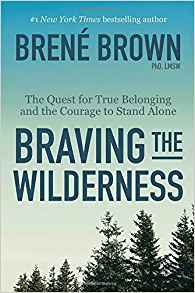Braving the Wilderness (2017)
Brené Brown
ISBN:9780812995848 (hardback)
–Review by Douglas Balzer
Any book title with the two keywords brave and wilderness in it grab my attention. Adventure and the wildness of the outdoors resonate with my soul. Now, knowing the author, Brené Brown, it is evident the content of the book would be based on the metaphor of the wilderness and the brave heart of exploring life and meaning. Still, I do like a good wilderness story, but this book offers a look at the mutual thinking about what it means to belong to our culture and society. The content is almost holistically based on Western culture, but nuances to other cultures pushing in the direction of an individualistic culture out of communal culture. The angst of the emotions of not belonging or unbelonging, as Brené writes, including feelings of anger and unrest are becoming prominent especially amongst the young generations.
One of my favorite features of Brown’s writing is her ability to combine storytelling and scientific research to expose what it means to belong and how important it is to the human psyche. Her storytelling is connective revealing the deep suffering and pain people experience through rejection, as well as showing how far people are willing to go to gain even a sense of belonging, a faux belonging.
One of the key concepts Brown brings out in the book is the issue surrounding the perspective that the global connection through the internet, travel, and migration were thought to be the key to bringing us all closer together. Instead, what was thought to be the magic bullet for human unity and oneness has not produced the utopia it was supposed to form. The global community instead has found it easier to connect with those who already share the same ideologies. Diversity and acceptance have not been the sum gain of technology. Instead, as a result of the hyperconnectivity of the internet age, humanity is following a familiar path of surrounding themselves with like-minded people, a fact that’s lead us to greater division. Brown recognizes her research and conclusions “are going to challenge long-held beliefs and ideas.”
It is tempting to join a group, why, because in human nature we were made for community. So, the reality is that no-one wants to or likes to feel alone. The problem with this issue is sometimes any group will do if it fulfills the human need to belong. It is part of the proliferation of gangs, militias, or a factional group. In Brown’s writing, she demonstrates that these groups actually serve only to increase the sense of loneliness and unbelonging particularly when the group offers no personal connection. Brown’s premise and solution are directed towards the internal; the real solution lies within. By looking inward, asking tough questions of ourselves, can we find the peace that comes with belonging and knowing our place in this world.
Brown does engage the spiritual as one of the paths in the wilderness. The metaphorical wilderness may be any unknown territory that is outside your comfort. Anything you are not used to or place where you are challenged to face your vulnerabilities and uncertainties. Okay, any place of personal and emotional discomfort will take you on the journey. She references mythologist Joseph Campbell, who is not my favorite source, but does make good points when addressing the human search for meaning, it was his journey after all to find faith and meaning. Brown effectively uses the connection with Campbell to direct us to take the journey into the wilderness of our soul.
Probably one of the most significant aspects Brown uses to challenge our humanness is the need to engage difficult conversations. Avoidance, well, is a poison to the soul. Being controlled by fear is to live a lonely life of defensiveness. She also pushes us, as the readers, to practice trust, not just of others, but also ourselves. Meaning that we make ourselves, and the things we value, open and vulnerable to the actions of others. Having the courage to live out trust and vulnerability. These are skills that can be developed.
The trailhead is before us leading into a vast wilderness, our wilderness, one within each of us. How brave are you? Are you willing to explore life and the meaning of belonging? Brené Brown’s book can serve as a trail guide so that we don’t have to go alone. She has brought together the best of storytelling and current science to make the tools available to those who are brave enough to enter the forest and the trees, encounter one’s own wild heart, and learn that change begins with ourselves first, not others.
The crux of Brown’s book is every human has an innate desire to belong. We can spend a whole lifetime in the journey to find even a sense of belonging, in the journey, a person can change a great deal. Brown points us to this conclusion – in the end, belonging is really about finding out who we are and accepting ourselves. So, the next time you are on social media or just engaging another human being, and you find yourself disagreeing, be self-aware and avoid any and all dehumanizing insults. It is commonplace for people to defend themselves and their ideologies they believe I by call people names, but that isn’t how real conversation works. Don’t take the bait. I hope you enjoyed this review. Please, leave a comment below for us. We appreciate your feedback.

